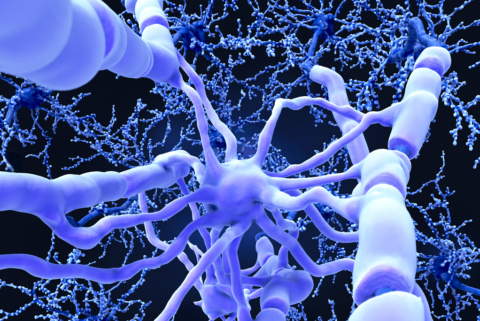Non-invasive method helps the survival of myelin-producing cells
Myelin production is shown to be promoted by a method known as repetitive transcranial magnetic stimulation
Last updated: 7th October 2019
Repetitive transcranial magnetic stimulation is shown to promote myelin production.
- Damage to myelin, the insulating sheath around nerve fibres, can lead to MS symptoms. Natural repair mechanisms often fail to completely repair this damage.
- An Australian team has looked at a non-invasive method for promoting myelin production in the brain as a way to boost natural myelin repair.
- In exciting new results, they have found that this method promotes the survival and maturation of myelin-producing cells in the brain.
In MS there is a loss of myelin in the brain and spinal cord. Myelin can be restored by the body’s natural repair mechanisms, but in progressive forms of MS, these mechanisms can’t repair the damaged myelin fully, leading to irreversible disability.Currently, there are no treatment options that can repair myelin damage for people with progressive MS, making this an important area of research.
A team at the Menzies Institute for Medical Research in Tasmania, funded by MS Research Australia, has explored the use of a non-invasive method called repetitive transcranial magnetic stimulation (rTMS) to promote myelin production. This method uses a rapidly changing magnetic field to generate small electrical pulses in the brain, stimulating certain areas. This method is currently used to treat depression in people where anti-depressants have not been successful.
There have also been a small number of rTMS clinical trials in people with MS, and in these trials, people have reported a reduction in fatigue, muscle spasticity and improved memory. However, how it leads to these benefits is unknown. Given that brain activity is known to promote myelin production, it is hoped that rTMS may be used to repair myelin in progressive forms of MS.
The study shows that multiple bursts of magnetic stimulation provided by rTMS to a laboratory model over a two week period, increased the number of new-born myelin-producing cells in the cortex, which is the outer layer of the brain. This increase was a result of the cells surviving longer than usual. However, these cells remained in an immature state and didn’t really contribute to myelin production.
The researchers then found that increasing the length of rTMS from two weeks to four weeks increased the number of mature myelin-producing cells in the brain. The increase in mature myelin-producing cells helped contribute to the length of myelin, showing that rTMS can influence myelin production.
This exciting work has shown that rTMS can promote the production of myelin for the first time.
With thanks to MS Research Australia – the lead provider of research summaries on our website.
